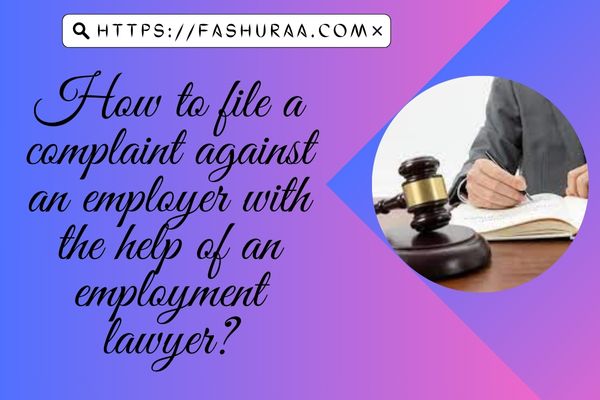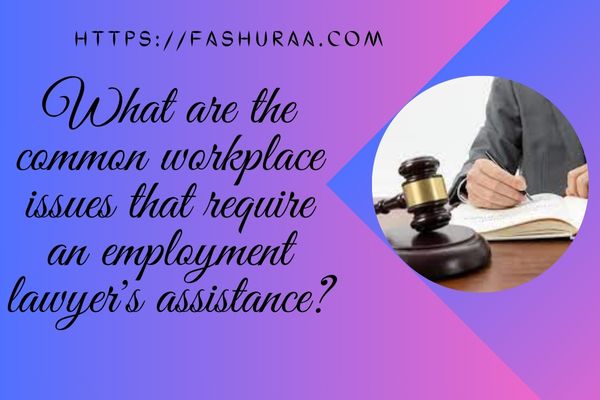How to file a complaint against an employer with the help of an employment lawyer?
December 14, 2023 | by Muaaz Shaheen

Introduction:
In this article, I’ll provide a comprehensive guide on the intricate process of filing a complaint against an employer, offering insights into the critical role that an employment lawyer plays in navigating the complexities of workplace disputes. Employment-related issues, whether stemming from wrongful termination, discrimination, or harassment, can be emotionally and legally challenging to navigate alone. Seeking the expertise of an employment lawyer is not merely a strategic choice but a fundamental step towards ensuring your rights are safeguarded, and justice is pursued diligently.
In the contemporary professional landscape, where employment laws can be intricate and varied, understanding how to file a complaint effectively is paramount. From the initial stages of consultation, where your case is assessed for legal merit, to the strategic formulation of a compelling case, an employment lawyer serves as a guide, advocate, and legal expert. Together, we will explore the key steps involved in filing a complaint against an employer and examine the nuanced considerations that can significantly impact the trajectory of your case.
Consultation with Employment Lawyer
Embarking on the journey of filing a complaint against an employer begins with a crucial step — the consultation with an experienced employment lawyer. This initial meeting is a pivotal opportunity to present the facts and circumstances surrounding your case. An adept employment lawyer will listen attentively, asking pertinent questions to gain a comprehensive understanding of the situation. This consultation sets the foundation for the entire legal process, providing insights into your case’s viability and the potential courses of action available.
During this consultation, expect the employment lawyer to outline the legal framework relevant to your situation, clarifying your rights and potential avenues for resolution. The discussion may touch upon key aspects such as applicable employment laws, statutes of limitations, and the realistic outcomes you can anticipate. Importantly, this stage allows you to gauge the competence and compatibility of the lawyer, ensuring that you choose legal representation aligned with your objectives and expectations. As the consultation concludes, you should leave with a clearer understanding of the merits of your case and the strategic steps that will be taken moving forward.
Assessment of Legal Merit
Following the initial consultation, the employment lawyer undertakes a comprehensive assessment of the legal merit of your case. This phase involves meticulously examining the facts, documents, and evidence you’ve provided. The lawyer will scrutinize the circumstances surrounding your complaint, evaluating the strength of your claims about applicable employment laws. This in-depth analysis aims to identify potential legal violations committed by your employer, forming the basis for the subsequent legal strategy.
The assessment of legal merit is a critical stage where the employment lawyer weighs the likelihood of success in pursuing your complaint. Factors such as the clarity of evidence, adherence to legal procedures, and the extent of potential damages are carefully considered. Honest and transparent communication between you and your lawyer is paramount during this phase, ensuring that all relevant details are disclosed for an accurate evaluation. The outcome of this assessment guides the formulation of a strategic approach tailored to the specific nuances of your case, enhancing the overall effectiveness of the legal proceedings.
Documentation of Incidents
Once the legal merit is established, the next phase involves detailed documentation of the incidents contributing to your complaint against the employer. This step is crucial for building a compelling case and providing a clear narrative that aligns with legal standards. Your employment lawyer will work closely with you to gather all relevant documentation, including emails, performance reviews, witness statements, and other tangible evidence supporting your claims. The goal is to create a comprehensive and coherent account of the events leading to your decision to file a complaint.
Thorough documentation not only strengthens your case but also assists in anticipating potential challenges that may arise during legal proceedings. Your lawyer may guide you on how to organize the information effectively, ensuring that key details are highlighted. This meticulous approach is essential for presenting a robust case that stands up to scrutiny. The documentation phase is also an opportunity for you to reflect on the intricacies of your experience, providing your lawyer with additional insights that might contribute to the overall legal strategy.
Evaluation of Employment Laws
Simultaneously, the employment lawyer conducts a rigorous evaluation of relevant employment laws applicable to your case. This involves a deep dive into federal, state, and local employment relationship regulations. The goal is to ensure a nuanced understanding of the legal landscape, identifying specific statutes and precedents that support your claims. Employment laws vary, and a thorough examination allows your lawyer to tailor the approach based on the jurisdiction and legal frameworks in play.
During this phase, your lawyer may pinpoint specific violations, such as discrimination, harassment, or wrongful termination, and analyze how these align with existing statutes. Clear comprehension of legal standards enables your lawyer to construct a persuasive argument, demonstrating how your employer’s actions or policies run afoul of established laws. This evaluation sets the stage for crafting a legal strategy that aligns with the intricacies of your situation, ensuring a targeted and effective approach as the case progresses.
Strategic Case Formulation
Armed with a thorough understanding of your case’s legal merit and the pertinent employment laws, the employment lawyer proceeds to formulate a strategic approach. This phase involves devising a detailed plan outlining how your case will be presented, the arguments that will be emphasized, and the legal avenues to pursue. The strategy aims to maximize the chances of a favorable outcome, considering the nuances of your specific situation and the legal precedents that support your claims.
Strategic case formulation requires a careful consideration of potential counterarguments from the employer’s side and an anticipation of legal challenges that may arise during the proceedings. Your employment lawyer will work with you to ensure the strategy aligns with your objectives and expectations. This phase marks a pivotal legal process, setting the stage for subsequent negotiations, alternative dispute resolution, or potential litigation.
Negotiation and Settlement Discussions
In many employment disputes, the goal is to resolve without going through the lengthy and often costly litigation process. Negotiation and settlement discussions become a crucial component of the overall strategy. Your employment lawyer will engage with the legal representatives of your employer, presenting your case and seeking a resolution acceptable to both parties. Negotiations may involve discussions about compensation, changes in employment conditions, or other remedies to resolve the issues.
The negotiation phase requires a delicate balance between assertiveness and flexibility. Your employment lawyer will advocate for your rights and interests while being open to constructive dialogue to facilitate a timely resolution. Successful negotiations can lead to a settlement agreement, outlining the terms both parties agree upon. This approach often provides a quicker and less adversarial resolution, allowing you to move forward without the protracted timelines associated with litigation. However, should negotiations prove unsuccessful, the next phase involves exploring potential alternative dispute resolution methods or preparing for litigation
Potential Alternative Dispute Resolution
When negotiations do not yield a satisfactory resolution, potential alternative dispute resolution (ADR) methods come into focus. ADR encompasses various approaches, including mediation and arbitration, providing an alternative to the traditional courtroom setting. Mediation involves a neutral third party facilitating discussions between you and your employer to find a mutually agreeable solution. Arbitration, on the other hand, involves a neutral arbitrator who makes a binding decision after reviewing the evidence presented by both parties.
The choice between mediation and arbitration often depends on your case’s specific circumstances and both parties’ preferences. ADR can offer benefits such as confidentiality, efficiency, and a less formal process than litigation. Your employment lawyer will guide you through this phase, helping you understand the pros and cons of each ADR method and assisting in preparing for the proceedings. The goal remains to resolve the dispute effectively while minimizing the time and resources expended in a prolonged legal battle.
Litigation Preparation and Filing
In instances where negotiation and ADR prove ineffective, the final phase involves the preparation for litigation and filing the complaint. Armed with a well-formulated strategy and a thorough understanding of your case, your employment lawyer will initiate the formal legal proceedings. This includes preparing the necessary legal documents, drafting the complaint, and filing it with the appropriate court. The litigation process follows defined timelines, during which both parties engage in the discovery phase, presenting evidence and building their respective cases.
Litigation is a more adversarial and formal process involving court appearances, legal motions, and potentially a trial. Your employment lawyer will guide you through each step, ensuring your rights are protected and your case is presented convincingly. The preparation for litigation demands meticulous attention to detail, comprehensive knowledge of relevant laws, and a strategic mindset to navigate the complexities of the courtroom. Throughout this phase, your lawyer will continue to advocate for your interests, aiming for a favorable judgment or a settlement that aligns with your goals.
Conclusion:
This guide serves as a roadmap through the intricate process of filing a complaint against an employer, emphasizing the pivotal role played by an employment lawyer. From the initial consultation, where the foundations of your case are laid, to the assessment of legal merit and meticulous documentation, each step contributes to building a compelling narrative. The strategic formulation of your case and negotiations underscore the importance of legal expertise in pursuing a resolution. Alternative dispute resolution methods offer flexibility, while the preparation for litigation demands a comprehensive understanding of legal intricacies.
Navigating workplace disputes with an employment lawyer safeguards your rights and ensures a systematic and informed approach to seeking justice. The empowerment gained through understanding the nuances of this process allows individuals to assert their rights within the legal framework, fostering a workplace culture that values accountability and fairness. Remember, each step in this journey asserts your voice and rights, working toward creating a professional environment where equity and justice prevail.
RELATED POSTS
View all


